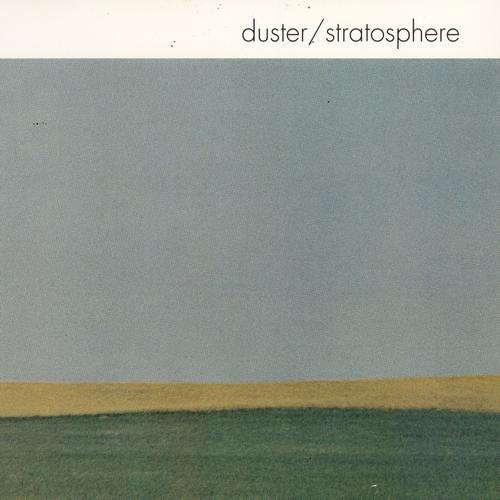Stratosphere is an apt title for Duster’s first LP. Given that the stratosphere is the second major layer of Earth’s atmosphere (i.e., not in space, but above the clouds), a fitting halfway point between Duster’s introverted slowcore and gauzy, bordering on space rock instrumentation can be drawn. Forget Music for Airports or In Search of Space, this is music for gazing at the clouds from an airplane window seat.
San Jose’s Duster was formed in 1996 by the multi-instrumentalists Clay Parton and Dove Amber. Prior to forming Duster, Parton and Amber were both in the frantically chaotic screamo group Mohinder, yet I never placed this connection until recently — frankly, it’s hard to imagine either band making anything that remotely resembles the other’s music. Regardless, I mention this because there’s one aspect between the two worth mentioning: feeling. It’s simple enough for one to hide behind metaphor or to mask earthly personality with guitar delay and songs that figuratively (or for some, literally) invoke space, yet the part of me that grew up listening to post-hardcore is often suspicious of this idea. While comparing the sounds of Duster and Mohinder is quite pointless, I’d like to think that Duster’s roots have something to do with maintaining an evocative sound that’s full of instrumental feeling.
Stratosphere is a record that actually sounds better for having been largely recorded to 4-track — the clean guitar interplay takes on an additional feeling of audible warmth because it was captured on tape, while the distorted guitars tend to maintain an enveloping fuzz, as on the seven-minute drone of Stratosphere’s title track. I’d suggest that both of Duster’s albums are essential for laid-back indie rock guitar fans, as not only does the band demonstrate an impeccable ear for tones, but also the ability to build relaxing songs out of cyclical, paradoxically meandering-yet-engaging guitar lines. The loud songs (e.g., “Echo, Bravo,” “Earth Moon Transit”) utilize feedback echoes and textured distortion, while more restrained tracks like “Topical Solution” and “The Landing” are relatively free of distortion yet retain a spaciousness befitting of the term “space rock.”
Compared with the myriad of other psych/space-leaning indie rock bands of the 90s, Duster’s records exist in a distinctly middle-ground niche. Aside from a few of their drone tracks, they rarely dealt in the sort of feedback/static washes utilized by Flying Saucer Attack; furthermore, they weren’t nearly as drugged-out as Spritualized, and they never fell in the turgid soloing that marred a sizeable chunk of Bardo Pond’s work. Normally this “middle ground” wouldn’t exactly be a ringing endorsement, but in Duster’s case it’s a comforting sitting (and, as an aside, Duster released an album of much sparser and atmospheric space echoes called Hier Kommt Der Schwartze Mond under the name Valium Aggelein the same year as Stratosphere, demonstrating their more abstract side). If anything, I’d compare Duster to a more atmospheric take on the clean, gorgeously layered guitar melodies of the Kadane brothers (Bedhead, The New Year) — Parton and Amber likely have more pedals than the Kadanes, but the feelings behind their approaches are similar. Both pairs make deceptively simple guitar lines sound effortless and beautiful, but the Kadane’s style generally feels more firmly rooted and ground-borne, while Duster’s guitars often sound like they’re floating — not out in space, but in the sky; jet stream echo as we fly from one place to another.
